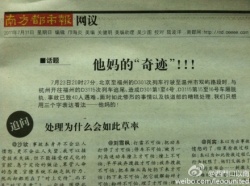“This is a miracle”的版本间的差异
来自China Digital Space
| (未显示2个用户的4个中间版本) | |||
| 第1行: | 第1行: | ||
| − | 这是一个奇迹 (zhè shì yí ge qíjì): this is a miracle | + | [[这是一个奇迹]] (zhè shì yí ge qíjì): this is a miracle |
[[File:wangyongping.jpg|250px|thumb|right|''Wang Yongping insists, “This is a miracle!”'']] | [[File:wangyongping.jpg|250px|thumb|right|''Wang Yongping insists, “This is a miracle!”'']] | ||
| 第37行: | 第37行: | ||
A total of three people were rescued from the train after the government had twice announced that there were no survivors. | A total of three people were rescued from the train after the government had twice announced that there were no survivors. | ||
| − | [[ | + | [[分类:Lexicon]][[分类:Wenzhou train crash]] |
2024年7月27日 (六) 19:43的最新版本
这是一个奇迹 (zhè shì yí ge qíjì): this is a miracle
A sarcastic phrase that mocks government incompetence and lack of responsibility. The phrase was popularized following a press conference that was convened on July 24, 2011 to discuss the Wenzhou train crash that took place the day before. At the conference, Ministry of Railways Spokesperson Wang Yongping was asked why a baby girl was found alive in the train wreckage after rescue efforts had been called off, and why the girl was only discovered by those who were in the process of dismantling the train (translated by ChinaGeeks):
Wang: This is a miracle. You ask why—
嗯,这是一个奇迹。你说为什么-
Reporter: This is not a miracle! What I want to ask is this: Why, after you had already announced that there were no survivors, when you had already begun to disassemble the train, why would there still be a survivor?
这不是奇迹!我想问一下是这样,你们宣布现场没有活着的人的情况之下,已经在对车进行拆解的情况之下,为什么还会出现这样活着的生命?
Wang: Let me answer that. This happened. We truly did find a girl who was still alive. This is the way things are.
我只能回答你,这样的事情就是发生了,我们确实在后面的工作当中发现了一个活着的女孩,事情就是这么样。[Source]
Many netizens lashed out at Wang calling the girl’s survival a “miracle,” not only because it obscured the Ministry’s own incompetence, but because Wang had also used the term to describe China’s high-speed railways. Just weeks before the accident, Wang praised the rail system [Chinese]:
China’s high-speed railways, built by the people under the supervision of the Party, are a modern miracle. They are a symbol of this nation’s capabilities. Every Chinese person deserves to be proud of, and pleased by, this.
中国高铁是中国人民在中国共产党领导下创造的人间奇迹,是我们国家实力的象征,每个中国人都为之感到骄傲和自豪。 [Source]
Because the high-speed rail system had been put forward as the “miracle” poster child of the “Chinese model” of development, the crash had a strong symbolic impact. The crash raised several questions: who benefits from China’s modern “miracle,” and who pays the price? Is China’s breakneck speed of development worth the inevitable cost in human life?
As author and blogger Li Chengpeng mused [Chinese]:
This train is not really a train at all. It is the nation’s totem. This nation is after all, a “miracle.” This nation needs a constant series of miracles to prove its superiority. That is because it understands that in a nation where very few have seen the ballot box; where Internet browsers often say, “The page your looking for does not exist;” where most rural people don’t know the difference between the courts and the prosecutors; where we watch movies that glorify the founding of the Party but where we can’t follow the founders’ examples and establish another party... in this kind of a nation, the only way we can prove our superiority is by an ever-increasing GDP.
这列火车已不是火车,它是一个国家的图腾,这个国家本身就是个奇迹。这个国家需要不断的奇迹来证明优越性。因为它明白,在一个很少有人见过选票,常显示“你所搜索的网页不存在”,大部份农民说不清法院和检察院的区别,看了建党伟业却不敢向先烈们学习建党……的国家,只有不断创造GDP奇迹才可证明优越性。[Source]
A total of three people were rescued from the train after the government had twice announced that there were no survivors.






